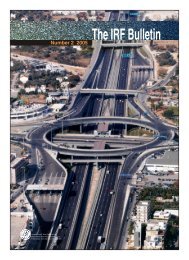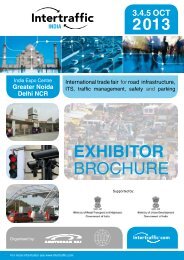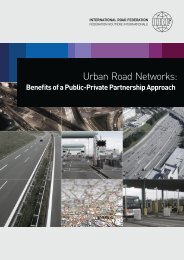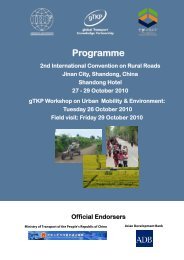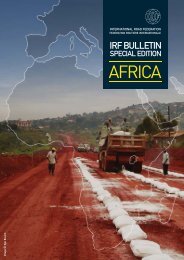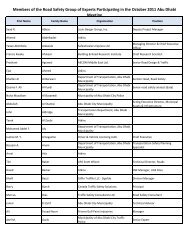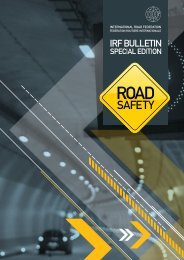TRANSPORT
TRANSPORT
TRANSPORT
- No tags were found...
You also want an ePaper? Increase the reach of your titles
YUMPU automatically turns print PDFs into web optimized ePapers that Google loves.
SHARING THE ROAD<br />
passengers to relatives (blood or marriage) – which proved<br />
unpopular with motorcycle taxis, and young lovers!<br />
Human behaviour causes many motorcycle accidents,<br />
so education and awareness campaigns, supported by<br />
consistent, fair enforcement, are appropriate. Local people<br />
and transport associations can stimulate compliance with<br />
regulations. Motorcycle taxi operators should compete<br />
on issues of safety. In some circumstances, promotion of<br />
three-wheelers could improve transport capacity, comfort<br />
and safety.<br />
Conclusions<br />
Motorcycles operating between a small town and main road in<br />
Colombia, including motorcycle taxis (carrying helmets), personal<br />
users and a motorcycle trailer.<br />
In many countries, crash helmets are compulsory but<br />
enforcement may be patchy. If crash helmets are only<br />
enforced for drivers, passengers may remain at risk,<br />
particularly young children. Some women passengers<br />
refuse helmets due to hairstyles. In Colombia, some<br />
motorcycle taxi drivers ride with helmets on their arms –<br />
being unconvinced but ready to comply if stopped!<br />
High-visibility vests, marked with large driver numbers,<br />
were successfully introduced in Cameroon, Colombia and<br />
Rwanda. Fear of identification by police reduces dangerous<br />
driving and visible numbers encourage public support of<br />
regulation through reporting. In Colombia, some authorities<br />
require clear numbers on crash helmets to reduce accidents<br />
and motorcycle crime.<br />
Motorcycle taxi operators often form associations to<br />
reduce competition problems and maintain standards<br />
and fares. Some associations become restrictive, anticompetitive<br />
cartels but others self-regulate to implement<br />
safety measures.<br />
Informal, demand-driven, private sector initiatives have<br />
led to popular motorcycle taxis services in many countries<br />
that have improved rural transport at no direct cost to<br />
governments or transport authorities. Governments have<br />
gained revenues from taxes on imports, fuel, licenses and<br />
personal tax liabilities. The main problems have been safety<br />
and security issues.<br />
The socio-economic issues surrounding motorcycle taxis<br />
need attention. Studies in different countries should<br />
document the advantages and constraints of motorcycle<br />
taxis to inform debate and policy formulation. Countries<br />
with many motorcycle taxis should exchange experiences<br />
and develop guidelines for effective regulation aimed at<br />
promoting socio-economic benefits and acceptable safety<br />
standards. Countries without motorcycle taxis should<br />
anticipate possible rapid adoption and prepare appropriate<br />
regulatory frameworks. Motorised three-wheelers should<br />
also be reviewed as public service vehicles.<br />
References<br />
Starkey P, 2008. Rural transport services in Africa: Lessons from rapid<br />
appraisal surveys in Burkina Faso, Cameroon, Tanzania and Zambia.<br />
SSATP Working Paper 87B. Sub-Saharan Africa Transport Policy<br />
Program (SSATP), World Bank, Washington DC, USA. 114p<br />
Some authorities ban motorcycle taxis for safety reasons.<br />
However, motorcycle taxi operators and users generally<br />
consider that the socio-economic benefits justify the risks<br />
– as there are many competing risks relating to health,<br />
livelihoods and mobility. Attempts to ban motorcycle taxis<br />
are often localised and short lived as services can restart<br />
easily. Bans in Colombia stimulated demonstrations in<br />
support of motorcycle taxis. Enforcement is problematic<br />
when drivers and passengers claim they are friends or<br />
relatives. Authorities in Colombia restricted motorcycle<br />
IRF BULLETIN SPECIAL EDITION: RURAL <strong>TRANSPORT</strong>, VOLUME-2 | 19



